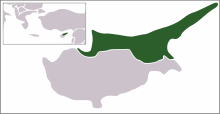LGBT rights in Northern Cyprus
| LGBT rights in Northern Cyprus | |
|---|---|

|
|
| Same-sex sexual activity legal? | Legal since 2014 |
| Gender identity/expression | No |
| Military service | Banned from military service |
| Discrimination protections | Yes |
| Family rights | |
| Recognition of relationships |
No |
| Adoption | No |
Same-sex sexual activity is legal in Northern Cyprus since 7 February 2014. Previous laws allowed three years prison sentences, according to articles 171 and 173 of its criminal code. Female homosexuality was not criminalised. Arrests for homosexuality have occurred as recently as 2011.
The laws were a legacy of British colonial rule, left over after the island gained independence in the 1960s. While the south decriminalised homosexuality in 1998 in order to accede to the European Union (EU) in 2004, the north's disputed status means it lies outside the EU's jurisdiction.
Repeal of the criminalisation of male homosexuality had been under serious consideration since 2006. In October 2011, MEP Marina Yannakoudakis claimed that during a visit to Northern Cyprus, President Derviş Eroğlu promised her he would legalise homosexuality to bring it in line with Turkey, Southern Cyprus, and the rest of Europe. In December 2011, it was announced that, due to mounting pressure from MEPs, Northern Cypriot lawmakers would repeal the law currently criminalising homosexuality. President Derviş Eroğlu, the incumbent leader of the government, expressed that he would sign the bill into law when it came to him.
This was delayed until two cases were brought against Northern Cyprus to the TRNC Constitutional Court and the European Court of Human Rights. Immediately after the case was lodged at the European Court, the TRNC Prime Minister's EU Coordination Centre drew up an amendment in April 2013 to repeal Articles 171, 172, and 173 of Chapter 154 of the republic's criminal code. This was expected to be approved, but was tabled.
In October 2013, preparations restarted to end the criminalisation of male homosexuality, and on 27 January 2014 the Assembly voted for repeal at Second Reading. The bill must be approved by the president before it becomes law; President Eroğlu had previously announced he would sign it.
If the legislation had failed to pass, the European Court of Human Rights would have likely heard the case and find criminalisation to be a violation of Article 8, in line with Dudgeon v United Kingdom.
...
Wikipedia
